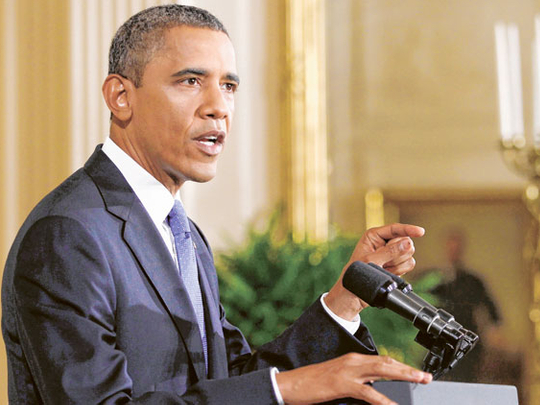
US President Barack Obama went home from ailing Europe — after attending the G20 summit at the start of November — to start an Asian-Pacific campaign by hosting Asia-Pacific Economic Cooperation (Apec) summit.
After Apec, he embarked on a week-long tour of Australia and Asia. In Australia, he boosted American military presence, few hundred miles from Asia. Though the expected permanent military presence in Australia is small compared to American bases in Japan and South Korea, it’s symbolic of US intent to counterbalance China and its influence in the Pacific Rim.
The Americans are keen to group the Pacific Rim into a trade bloc that might, along with Africa, relieve the pain of US economy resulting from faltering Europe. The military boost in Australia is intended to diffuse the impact of military withdrawal from Iraq and soon from Afghanistan.
When Obama delivered his speech to Muslims and Arabs from the Cairo University in June 2009, analysts talked about a paradigm shift in US policy towards the region.
The main theme was that Cairo speech carried a reconciliatory tone, different from the arrogance of the Bush administration, and meant America will rely more on ‘soft power’ rather than ‘military power’.
That was evident in the American involvement in the main issue of the region: Palestine. The role of an active mediator was reduced to just ‘facilitator’ and the resolution of the Palestinian-Israeli conflict left to “the parties concerned through direct negotiation”.
More military involvement in the region could not only be divisive, but might backfire. That disengagement does not mean the Americans are abandoning their interests in the region. They are just seeking to protect it by means other than direct involvement — especially military involvement.
Europe’s problems
Though American warships are still in the Gulf, troops and armour scattered in other parts of the Arabian Peninsula, direct action is no longer an option.
The war on Libya to topple Muammar Gaddafi’s regime was left to Nato and some Arabs, and the American involvement was part of Nato’s. Now in Syria, it’s totally left to Arabs to do the job. Even if Iran is to be attacked, it’ll be Israel in the lead.
Economically, Europe is becoming a source of anxiety for the Americans. The US has got a sovereign debt problem not much less than that of the Eurozone. American financial institutions, especially money-market funds, are heavily exposed to the sovereign debt crisis in Europe. Disengagement is not simple, but US has to hedge itself against any contagion from Europe.
Seeking alternative trade partners in Asia and Africa can’t replace the role of Europe in American foreign trade and economic cooperation. Yet, it might be a good hedge, if Europe managed to overcome its problems and prevent a global double-dip recession.
Exactly as Australia can’t replace Germany or Turkey in American foreign military presence plans, Singapore and New Zealand won’t replace UK and France in American foreign trade and economic cooperation.
So, the case with Europe is a temporary shift to hedge against economic risks. But in the Middle East, disengagement is a long-term strategy conforming to reassessment of interests and ways to protect them.
It looks like the era of unilateral American intervention, disguised as international coalition to follow Washington’s cause, is over or about to be.
Working more through Nato to protect American interests in Euro Med region is consistent with the new trend of internal-focussing rather than foreign outreach at a time of American economic hardship. That would definitely give way to some peripheral powers such as France or Turkey or even small regional ones like Qatar to play a role — even within the American framework.
Dr Ayman Mustafa is a London-based Arab writer.








